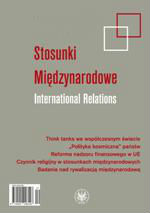PROJEKT SYNERGII CZARNOMORSKIEJ – NOWA FORMUŁA WSPÓŁPRACY REGIONALNEJ UNII EUROPEJSKIEJ
The Black Sea Synergy Project – a New Formula for EU Regional Cooperation
Author(s): Monika ArcipowskaSubject(s): Politics / Political Sciences
Published by: Wydawnictwa Uniwersytetu Warszawskiego
Keywords: Synergia Czarnomorska; współpraca państw Basenu Morza Czarnego i UE
Summary/Abstract: In April 2007 the European Commission presented the offi cial version of a document entitled “Black Sea Synergy – a New Regional Cooperation Initiative”. This Synergy was envisioned as developing instrument in connection with the expansion of ENP and CFSP leading to increase their cooperation within the Black Sea region and between that region and the EU. A dialogue within the framework of BSS is to be based on the coordination of the EU’s current activities in the Black Sea basin (regional programs and bilateral agreements). The proposals presented by the European Commission did not address two key areas: security and military issues. The countries involved in BSS cooperate in three strategic dimensions: political, economic (above all energy), and social. Over the last few years, Brussels has been attempting to increase its presence in the Black Sea region as an important element in its strategy, to enhance the security of the EU (including in the fi eld of energy) and encourage political stabilization in the neighbouring Eurasian region. It is also a growing economic market, additionally important as an area crossed by transport and energy routes. A material factor affecting the development of cooperation within the framework of BSS is the fact that most of the countries belonging to BSS were formerly part of the Soviet bloc, and thus are still regarded by Moscow as being under its infl uence. Without the active involvement of Russia in regional decisions on cooperation concerning for instance the resolution of “frozen confl icts”, or guaranteeing of regional security and the development of a common regional energy policy, the implementation of such decisions is impossible. Moscow is attempting to maintain its political infl uence in this area by steering the work of the Organization of the Black Sea Economic Cooperation (BSEC) which is in fact the basic institutional pillar for the development of cooperation within the BSS. Considering the fact that current relations between Russia and the EU have far from exhausted their potential (e.g. the new PCA), the BSS project could become a good vehicle for reviving the dialogue between Brussels and Moscow and an effective instrument for the realisation of Brussels’ foreign policy goals in the Black Sea region.
Journal: Stosunki Międzynarodowe
- Issue Year: 42/2010
- Issue No: 3-4
- Page Range: 33-53
- Page Count: 21
- Language: Polish

